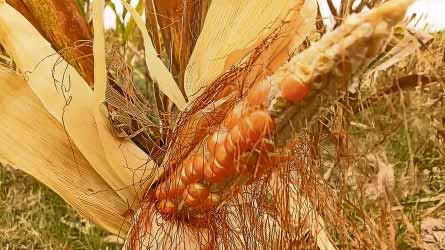
NO WATER Corn crops in the town ofM’lang, North Cotabato province, have started to wither due to the drought. WILLIAMOR MAGBANUA
Drought is now exacting a heavy toll on farms nationwide as a top official of one of the worst-hit areas, Ilocos Norte, called for a water summit next week to plan out mitigating measures against El Niño.
“We must be proactive in bringing help to our farmers,” Ilocos Norte Gov. Imee Marcos said in a statement.
The Philippine Atmospheric, Geophysical and Astronomical Services Administration (Pagasa) had identified several provinces already experiencing drought—Ilocos Norte, Zamboanga del Sur, Zamboanga Sibugay, Maguindanao, Sulu, Bukidnon, Basilan, Lanao del Norte and Lanao del Sur.
This meant three consecutive months of 60 percent rainfall reduction or five consecutive months of at least 21 percent rainfall reduction.
Early harvest
In Laoag City, farmers have started harvesting crops earlier than scheduled before these are laid to waste by high temperatures.
Edwin Cariño, Ilocos Norte Sustainable Development Office head, said the summit should gather representatives of farmers, the academe, research centers, irrigators group and agriculture officials.
Cariño said at least five measures were ready for implementation—rain harvesting, switching to short-gestation crops, use of enhanced fertilizers with better water-retention properties, installation of pond liners to collect water and the use of gray water to avoid wastage and maximize water use.
Assistance, Marcos said, must be targeted at “critical areas.”
“We must release emergency funds for our farmers,” she said.
She said local government units, like that of Ilocos Norte, needed help from the national government to assist farmers.
State of calamity
In North Cotabato, the Provincial Disaster Risk Reduction and Management Council (PDRRMC) was set to recommend the declaration of a state of calamity to the provincial board after officials estimated that crop damage caused by lack of rainfall had already reached P300 million since January.
Arnulfo Villaruz, PDRRMC action officer, said the estimate could still go up as officials awaited damage reports from the towns of Makilala, Magpet and Arakan.
Most upland farms in North Cotabato are rain-fed, according to Villaruz.
Of 13 towns hit by the extreme weather in North Cotabato, five had already declared themselves to be in a state of calamity—M’lang, Tulunan, Pikit, Alamada and Aleosan.
Task force
In the province of Albay, the agriculturist’s office has already created Task Force El Niño.
Farms, according to agriculturist Che Rebeta, are now suffering from water shortage “as the temperature is becoming hotter and hotter.”
The provincial government was also planning to distribute water pumps to farmers, Rebeta said.
In the town of Libon, Albay, municipal agriculturist Alejo Serrano said hundreds of hectares of rice farms had already been damaged by drought. —REPORTS FROM WILLIAMOR MAGBANUA AND MICHAEL B. JAUCIAN